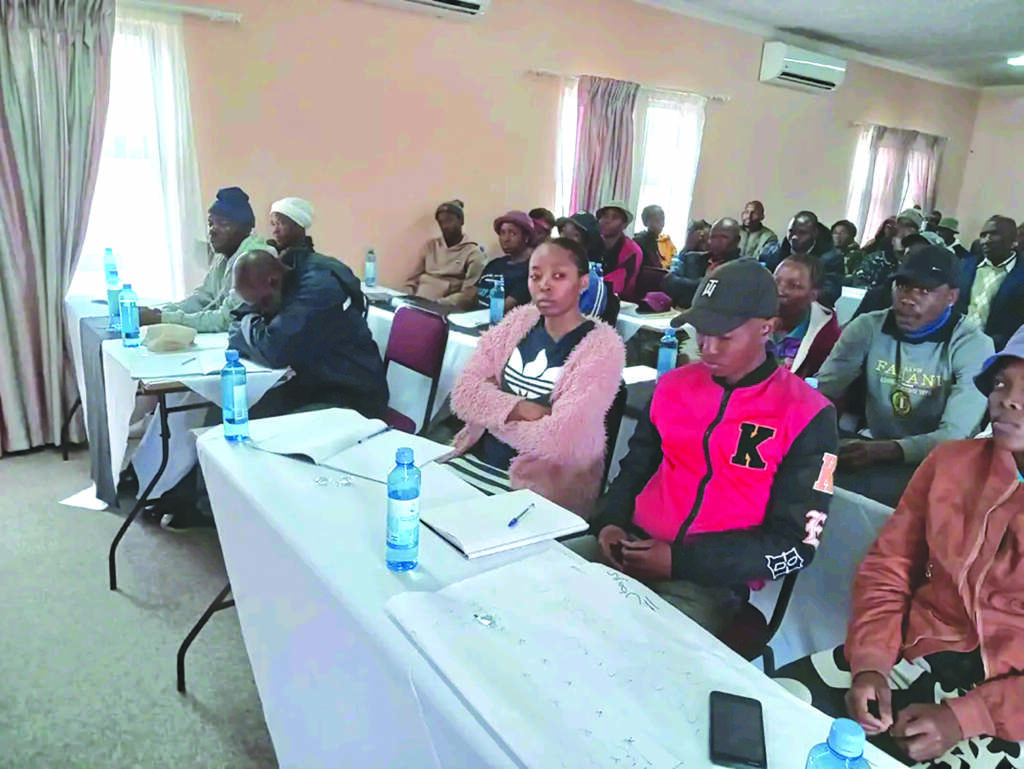Libuseng Molato
The Smallholder Agriculture Development Project II (SADP) is making impactful strides in enhancing agricultural skills and productivity among youth in Lesotho.
The Project recently organised an intensive five-day training session at Thaba-Bosiu for farmers from the Mokema sub-centre, aimed at fostering agricultural skills, generating income, and combating unemployment.
The session saw a robust participation of 55 attendees, predominantly youths.
Empowering Farmers Through Education
Mathabiso Selibo, an extension officer, explained that the training cohort comprised farmers aged 25 to 65 from Mishaka and Koma-koma, alongside young farmers aged 18-35. This diverse group she said was brought together to receive guidance and collaborate in producing quality agricultural products for both household consumption and commercial purposes.
Selibo highlighted the Farmers Field School (FFS) approach utilised during the training as a practical learning instrument to measure impact.
“FFS is a learning approach that teaches farmers how to experiment and solve problems independently. It’s often called a ‘school without walls’ because farmers learn by doing. We provide training to improve agricultural production and to reduce gender inequality, targeting minority groups and community development. Farmers work in groups and share work and each group has its name and motto that will help them remember their work,” she noted citing this method ensures that farmers gain practical, hands-on experience, crucial for improving their farming techniques.
Practical Skills and Environmental Awareness
The training provided skills aimed at improving agricultural production, reducing gender inequality, and fostering community development.
Farmers were further taught the importance of maintaining detailed records of their farming activities.
“To achieve the best performance, farmers are given forms to fill out each time they go to the field. This helps them track their activities, monitor crop conditions, and learn from their experiences to avoid repeating mistakes The purpose is to help them grow to farm commercially, so keeping records will help them learn and not repeat mistakes so they excel in farming,” Selibo elaborated.
A key focus of the training was environmental stewardship where farmers were educated on the ecosystem and the vital connections between living and non-living components.
They learned about Agro-Ecosystem Analysis (AESA), which Selibo described as the cornerstone of the FFS approach.
“AESA involves weekly field observations of the interactions between crops, animals, and their environment. This helps in keeping detailed records and integrating pest management strategies, such as creating organic pest repellents,” she explained.
Targeted Support and Remarkable Achievements
She indicated that extension officers also conduct individual visits to help farmers identify their strengths and group them accordingly for optimal production. “Thanks to these efforts, farmers have already ploughed five hectares of peas and are preparing to plant potatoes, this is progress.”
Manthona Ramotena, another extension officer from Mofoka, shared the success story of a youth group formed through village gatherings which was encouraged to take up farming. This group, Ramotena said now manages 4.8 acres of land and has sown peas.
“Last year, we had women aged 20-65 graduating from the FFS program. Their progress is assessed through AESA form completion and their understanding of farming principles is commendable since they completed the program,” Ramotena stated.
Inspiring Testimonies and Future Vision
The training has had a profound impact on the participants, as Mosala Nchola, a young farmer, expressed his gratitude, “This training motivated us to focus and produce food ourselves while generating income. I have learned how to eat healthily and manage pests organically.”
Tankie Nchoela, an elder from Komakoma, praised the initiative for keeping youth engaged and away from crime.
“All gratitude to SADP and our extension officers. This great work helps keep youth busy and focused,” he said.
SADP Project Field Officer Mopeli Mphoto commended the extension officers for their dedication to equipping farmers with essential knowledge and skills noting, “SADP’s mandate is to ensure human well-being, food security, and the development of the agricultural sector by helping smallholder farmers generate income. We are always ready to support any call.”
Through practical training, environmental awareness, and strategic support, Mphoto noted that SADP is not only improving agricultural productivity but also fostering a new generation of informed, capable, and motivated farmers.
Summary
- This helps them track their activities, monitor crop conditions, and learn from their experiences to avoid repeating mistakes The purpose is to help them grow to farm commercially, so keeping records will help them learn and not repeat mistakes so they excel in farming,” Selibo elaborated.
- A key focus of the training was environmental stewardship where farmers were educated on the ecosystem and the vital connections between living and non-living components.
- SADP Project Field Officer Mopeli Mphoto commended the extension officers for their dedication to equipping farmers with essential knowledge and skills noting, “SADP’s mandate is to ensure human well-being, food security, and the development of the agricultural sector by helping smallholder farmers generate income.

Your Trusted Source for News and Insights in Lesotho!
At Newsday Media, we are passionate about delivering accurate, timely, and engaging news and multimedia content to our diverse audience. Founded with the vision of revolutionizing the media landscape in Lesotho, we have grown into a leading hybrid media company that blends traditional journalism with innovative digital platforms.







